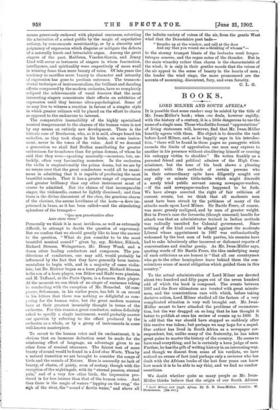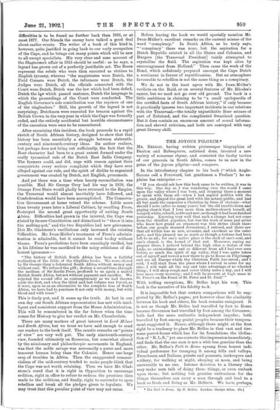BOOKS.
LORD MILNER AND SOUTH AFRICA.*
IT is possible that some readers may be misled by the title of Mr. Iwan-Miiller's book ; when one deals, however rapidly, with the history of a century, it is a little dangerous to use the name of a single man. Those who dislike formal "appreciations" of living statesmen will, however, find that Mr. Iwan-Mtiller heartily agrees with them. His object is to describe the task before Lord Milner, and, as he happily says in his introduc- tion, "there will be found in these pages no panegyric which exceeds the limits of approbation one man may express to another in his presence without shuddering himself or causing his unhappy victim to shudder." He writes frankly as a personal friend and political admirer of the High Com- missioner, but the tone of his book shows a pleasing contrast with the methods of certain persons who in their extraordinary spite have diligently sought out any silly or minute tittle-tattle which might discredit a sorely tried public servant among newspaper-readers, —if the said newspaper-readers happened to be fools. We have always asserted the right of fair criticism of current events, but we think that all moderate men must have been struck by the pettiness of many of the attacks made upon Lord Milner. Sir Bartle Frere, of course, was more grossly maligned, and by men of greater weight. But in Frere's case the favourite (though unsound) handle for attack was that an administrator trained in Indian methods was radically unsuited for Colonial government. Since nothing of the kind could be alleged against the moderate Liberal whose appointment in 1897 was enthusiastically welcomed by the best men of both parties, his enemies have had to rake laboriously after incorrect or dishonest reports of conversations and similar gossip. As Mr. Iwan-Milller says, quoting words of Sir Bartle Frere, the idea underlying many of such criticisms as are honest is "that all our countrymen who go to the other hemisphere leave behind them the con- scientious sense of moral obligation which guided them in this country."
To the actual administration of Lord Milner are devoted about two hundred and fifty pages out of the seven hundred odd of which the book is composed. The events between 1897 and the Boer ultimatum are treated with great minute- ness, and the conscientious care with which, before taking decisive action, Lord Milner studied all the factors of a very complicated situation is very well brought out. Mr. Iwan- Muller meant to have attacked the problems of reconstruc- tion, but the war dragged on so long that he has thought it better to publish at once his review of events up to 1899. It is odd that the war should have stopped so suddenly after this resolve was taken; but perhaps we may hope for a sequel. Our author has lived in South Africa as a newspaper cor- respondent, but, unlike many of the fraternity, he has taken great pains to master the history of the country. He seems to have read everything, and he is certainly a keen judge of men. Further, he has the gift of writing history in an interesting way, and though we dissent from some of his verdicts, we have noticed no errors of fact (and perhaps only a reviewer who has dealt with the African books of the List four years can know how much it is to be able to say this), and we find no rand= assertions.
We doubt whether quite so many people as Mr. Iwan. Muller thinks believe that the origin of our South African
* Lord Milner and Squitli Africa. By E. B. Iwanalaller. London ; W. Heinemann. DAL net./
difficulties is to be found no further back than 1881, or at most 1877. Our friends the enemy have talked a good deal about earlier events. The writer of a book of this kind is, however, quite justified in going back to our early occupation of the Cape, and he brings out many points which will be new
to all except specialists. His very clear and sane account of the SlagterErnek affair in 181,5 should be useful : as he says, a
legend has grown out of a perfectly justifiable act. The Boers represent the rebels who were then executed as victims to English tyranny, whereas "the magistrates were Dutch, the
Field Cornets were Dutch, the informers were Dutch, the Judges were Dutch, all the officials connected with the Court were Dutch, Dutch was the law which had been defied, Dutch the laiw which passed sentence, Dutch the language in
which the proceedings of the Court were conducted. The English Governor's sole contribution was the reprieve of one of the ringleaders." Still, the growth of the legend is not surprising; Dutchmen were executed for treason against the British Crown in the very year in which the Cape was formally ceded, and the entirely accidental but horrible circumstances of the execution were sure to be remembered.
After examining this incident, the book proceeds to a rapid sketch of South African history, designed to show that that history has been essentially a struggle between sixteenth- century and nineteenth-century ideas. Its author realises, but perhaps does not bring out sufficiently, the fact that the Boer character had been to a great extent formed under the really tyrannical rule of the Dutch East India Company. The farmers could, and did, urge with reason against their compatriots every serious complaint which they have ever alleged against our rule, and the spirit of dislike to organised government was created by Dutch, not English, proconsuls.
And yet there was a time when hearty reconciliation was possible. Had Sir George Grey had his way in 1858, the Orange Free State would gladly have returned to the Empire, the Transvaal would almost inevitably have followed, and Confederation would have been accomplished. The Conserva- tive Government at home vetoed the scheme. Little more than twenty years later a Liberal Cabinet, by recalling Frere,
elestroyed the second great opportunity of uniting South Africa. Difficulties had grown in the interval, the Cape was elated by its new Constitution and disinclined to "throw it into the melting-pot," and the two Republics had new grievances. But Mr. Gladstone's vacillations only increased the existing ilifficulties. Mr. Iwan-Miiller's treatment of Frere's adminis- tration is admirable, but it cannot be read to-day without thame. Frere's predictions have been amazingly verified, but in his lifetime he was sacrificed to the noisy criticisms of dis- honest ignorance :—
" The history of British South Africa has been a faithful realisation of the fable of the Sibylline books. We were offered by Sir George Grey a federated South Africa without money and without cost. We refused the gift; destiny a second time, through the medium of Sir Bartle Frere, proffered to us again a united British South Africa, but not without payment and sacrifice. We rejected the second offer as contemptuously as we had thrown aside the first, and when the third and last volume was forced, as it were, upon us as an alternative to the complete loss of South Africa, we have had to purchase it not only with money, but with blood and with tears."
This is finely put, and it sums up the truth. At last in our own day our South African representative has met with intel- ligent and consistent support from the Home Administration. This will be remembered in the far future when the time comes for History to give her verdict on Mr. Chamberlain.
There are many matters of great interest in Lord Milner and South Africa, but we trust we have said enough to send our readers to the book itself. The caustic remarks on "points of view" are very well put. The early nineteenth-century view, founded ultimately on Rousseau, but somewhat altered by the missionary and philanthropic movements in England, was that the noble savage was necessarily a purer and more innocent human being than the Colonist. Hence one large crop of troubles in Africa. Then the exaggerated commer- cialism of the mid-century tended to make people think that the Cape was not worth retaining. Then we have Mr. Glad- stone's creed that it is right in Opposition to encourage sedition, right in office to refuse to redeem the promises then made to the seditious, and finally, right to surrender to open rebellion and break all the pledges given to loyalists. We may trust that this peculiar point of view may not recur.
Before leaving the book we would specially mention Mr. Iwa,n-Miiller's excellent remarks on the current misuse of the word "conspiracy." In South Africa, as he truly says, "conspiracy' ' there was none, but the aspiration for a Dutch Republic existed in all the States and Colonies, and Burgers [the Transvaal President] vainly attempted to crystallise the fluid. The aspiration was kept alive by encouragement from Holland." Then came the work of the Bond, which sedulously prepared amongst the Cape Dutch a sentiment in favour of republicanism. But an atmosphere favourable to rebellion is not the same thing as a conspiracy.
We do not in the least agree with Mr. Ivran-Miiller's verdicts on the Raid, or on several features of Mr. Rhodes's career, but we need not go over old ground. The book is a little ambitious in claiming to be "a small cyclopaedia of the certified facts of South African history," if only because it practically ignores two important incidents in our relations with the Transvaal,—the totally unjustifiable Boer seizure of part of Zululand, and the complicated Swaziland question. But it does contain an enormous amount of sound informa- tion and shrewd criticism, and both are conveyed with very great literary skill.







































 Previous page
Previous page